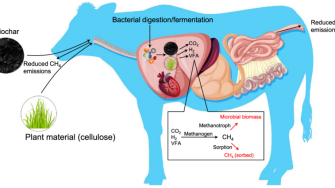
Synopsis
Methane is a potent greenhouse gas (GHG) that increases the risk of catastrophic climate change. In ruminant animals, cellulosic feed materials are digested in the rumen by microbial fermentation that generates approximately 80% of the methane from ruminants. Enteric methane represents between 7-18% of total anthropogenic GHG emissions.
Activated carbon (AC) is one material under active investigation both in Australia and overseas to reduce methane emission. Recent research trials with dairy cattle demonstrated that a 0.5% AC addition to feed reduces methane emissions by 30-40%, while improving daily milk production. Microbiome analysis showed that methanogenic microbes decreased by 30% on average with a corresponding increase in the non-methanogenic species (Al-Azzawi 2021).
Aims
The research project will initially apply a batch fermentation method with rumen fluids to further characterize planktonic and sessile microbiomes, with a focus on colonisation of activated carbon particles. It maybe also be possible to develop a flow system (Rusitec) and compare microbial development over time (Czerkawski 1977). Insight into the interaction of microbiomes with AC will provide new scientific knowledge on how methane emission from ruminants can be further reduced.
Al-Azzawi, M., L. Bowtell, K. Hancock and S. Preston (2021). "Addition of Activated Carbon into a Cattle Diet to Mitigate GHG Emissions and Improve Production." Sustainability 13(15): 17. Czerkawski, J. (1977). "Design and development of a long-term rumen simulation technique (Rusitec)." British Journal of Nutrition.
Supervisor: Prof. Torsten Thomas and Dr. Tim Charlton
